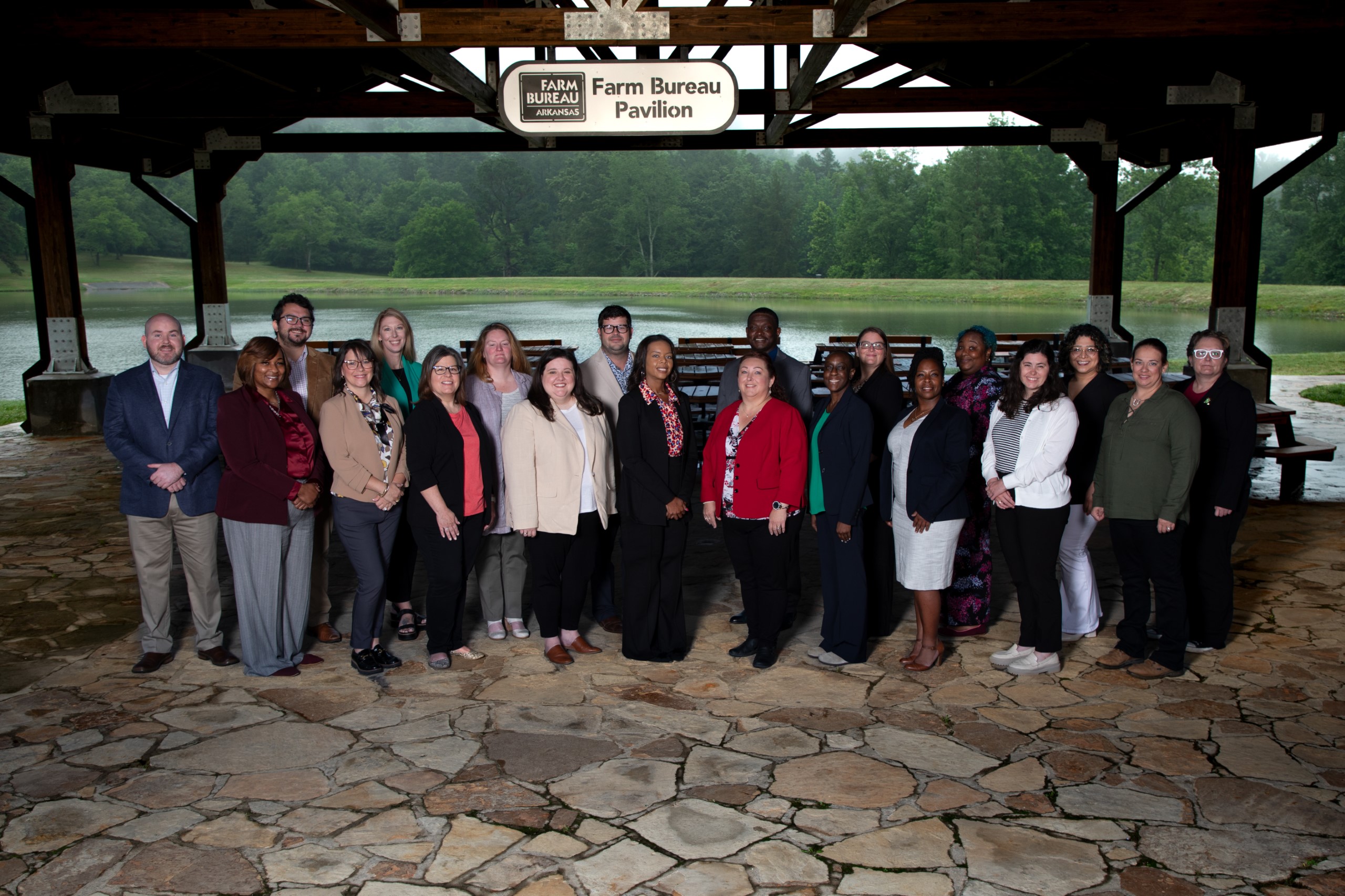State’s longest-running leadership program announces new LeadAR Class
Class 21 wants to make a difference in their communities.
By Tracy Courage
U of A System Division of Agriculture
June 5, 2025
Fast Facts:
- Class 21 includes 21 Arkansans from 12 counties
- Participants work in wide range of industries: agriculture, government, health education, law, small business
- Program equips Arkansans with knowledge, skills, and networks they need to make a difference in their communities
(690 words)
(Newsrooms: Group photo)
LITTLE ROCK — Members of the newest LeadAR class live in rural and urban areas, work in various industries, and have diverse backgrounds, but they share a goal: They all want to be better leaders so they can make a difference in their communities.

Lead AR Class 21 will spend the next 18 months gaining the knowledge, skills, and networks to do just that.
LeadAR — short for Leadership Arkansas — is offered through the University of Arkansas System Division of Agriculture. The new class includes 21 professionals from 12 counties across the state. They work in various industries, including agriculture, city government, economic development, healthcare, education and law. Some are small business owners, while others work for state government and nonprofits.
“We have selected people who want to make a difference and position themselves to have an impact in their communities and state,” said LeadAR Director Julie Robinson, a professor of leadership development for the Division of Agriculture. “Many of our alumni say LeadAR has been a life-changing program for them.”
The group met in late May for three days of goal setting and team building at the C.A. Vines Arkansas 4-H Center. Over the next year and a half, they’ll meet in different regions across Arkansas to interact with the state’s top industry leaders, tour communities, and learn how issues affecting rural and urban communities are interwoven.
In September, they’ll travel to Washington, D.C., where they will visit congressional leaders to discuss current issues facing their communities and how they can be addressed.
The program culminates with an international study tour in 2026, to learn how international issues compare and impact Arkansas. Past classes have visited Greece, Bolivia, Canada, Australia, Vietnam, Scotland, Panama, Portugal, Costa Rica, Brazil and China. The most recent class toured Morocco in 2024.
Ultimately, the program prepares participants to launch a leadership project that can improve the quality of life for their communities.
LeadAR Class 21 Members
Baxter County
Dani Pugsley – President/CEO, Mountain Home Area Chamber of Commerce
Benton County
- Ayanna Bledsoe – Director of inclusion and belonging at Crystal Bridges Museum of American Art, Bentonville
- Daisy Bonilla – Mental health provider, Growing in Healing, Rogers
Faulkner
- Austin DuVall – Marketing and communications Manager, Winthrop Rockefeller Institute, Morrilton
- Vernice Nazare King – Founder, PlaceForResources, Conway
Franklin County
Adam Watson – President of business development, Gas Logix, Branch
Hot Spring County
Megan Hobbs – LPN, Baptist Family Clinic, Malvern
Lafayette County
Amber Overholser – Associate professor/master of public administration program director,
Southern Arkansas University, Magnolia
Lawrence County
Jacki Whisnant – Human resources specialist, Arkansas Department of Transportation,
Batesville
Logan County
Tonya Fletcher – Executive director, Paris Area Chamber of Commerce
Perry County
- Creenna Bocksnick – Arkansas 4-H camping coordinator, Cooperative Extension Service, Ferndale
- Rena' Lawson – Perry County chief deputy county/ circuit clerk, Perryville
Pulaski County
- Vivian Brittenum – Director of business services and special projects, Central Arkansas Planning and Development District, Lonoke
- Derek Ingram – Fire marshal, Little Rock Fire Department
- Pam Keith – Dyslexia lead teacher, Pulaski County Special School District, Little Rock
- Matthew Magdefrau – Video production specialist, Arkansas Farm Bureau Federation, Little Rock
- Quinyatta Mumford – CEO, Mumford and Associates Inc. DBA Village Public Health, Little Rock
- Nicole Nichols – Saline County extension staff chair, Benton
Pope County
Tabatha Duvall – Assistant director, University of Central Arkansas Center for Community
and Economic Development, Conway
Washington County
- Dre Jones – Fayetteville City Council member
- Emily Stone – Staff attorney, National Agricultural Law Center, Fayetteville
LeadAR, founded in 1984, was originally modeled after the W.K. Kellogg Foundation’s leadership training program. Now more than four decades later, LeadAR has more than 500 alumni serving as leaders in businesses and communities throughout Arkansas, especially in rural and agricultural areas.
To learn more about LeadAR, visit http://uaex.uada.edu/leadar. To learn about other extension programs in Arkansas, contact your local Cooperative Extension Service agent or visit www.uaex.uada.edu. Follow us on Facebook at arkansas.extension and on X and Instagram at @AR_Extension. To learn more about Division of Agriculture research, visit the Arkansas Agricultural Experiment Station website: https://aaes.uada.edu. Follow on X at @ArkAgResearch. To learn more about the Division of Agriculture, visit https://uada.edu/. Follow us on X at @AgInArk.
About the Division of Agriculture
The University of Arkansas System Division of Agriculture’s mission is to strengthen agriculture, communities, and families by connecting trusted research to the adoption of best practices. Through the Agricultural Experiment Station and the Cooperative Extension Service, the Division of Agriculture conducts research and extension work within the nation’s historic land grant education system.
The Division of Agriculture is one of 20 entities within the University of Arkansas System. It has offices in all 75 counties in Arkansas and faculty on three campuses.
Pursuant to 7 CFR § 15.3, the University of Arkansas System Division of Agriculture offers all its Extension and Research programs and services (including employment) without regard to race, color, sex, national origin, religion, age, disability, marital or veteran status, genetic information, sexual preference, pregnancy or any other legally protected status, and is an equal opportunity institution.
# # #
Media Contact: Tracy Courage
Director of Communications-Extension
U of A System Division of Agriculture
501-658-2044